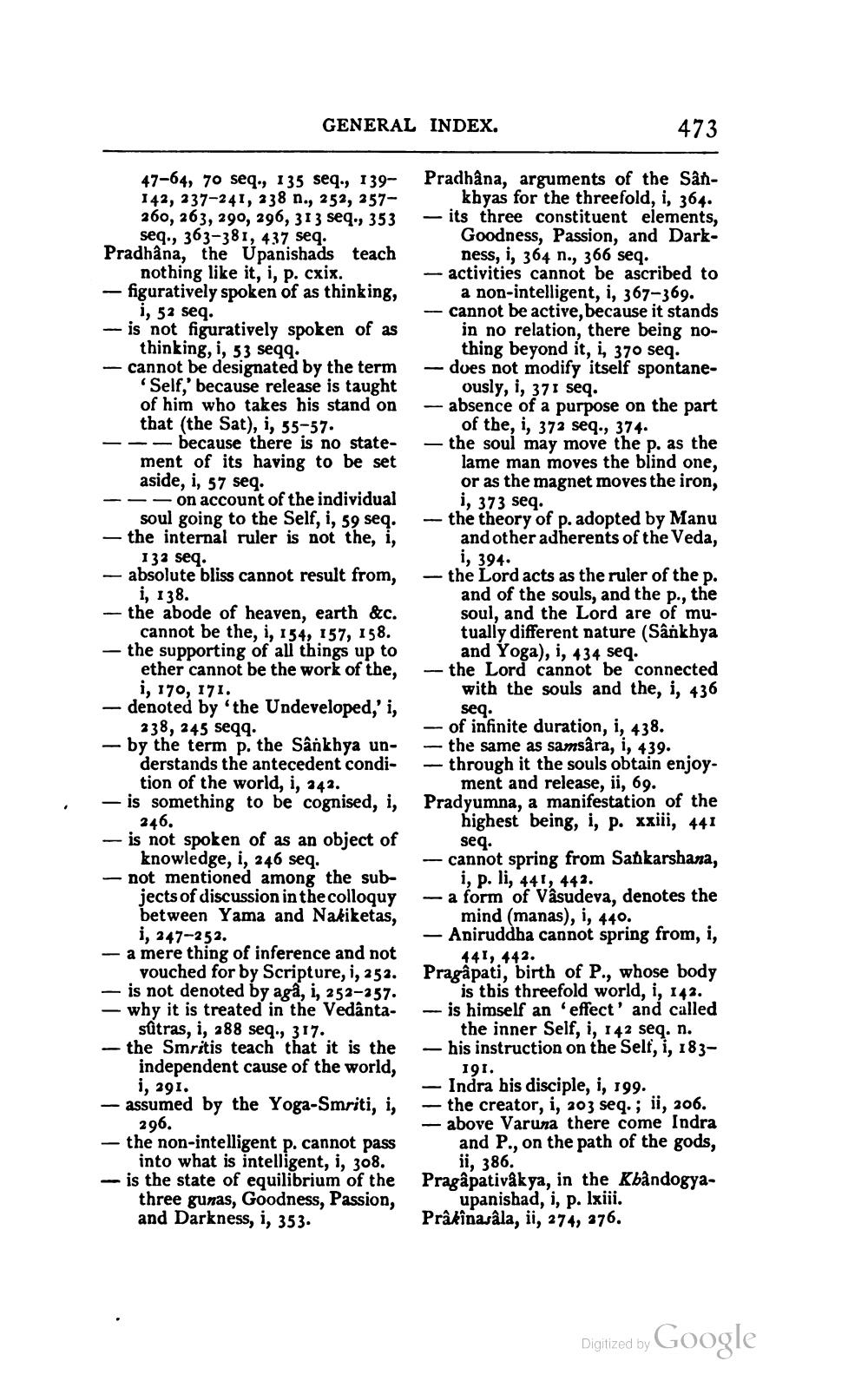________________
GENERAL INDEX.
473
47-64, 70 seq., 135 seq., 139- 142, 237-241, 238 n., 252, 257- 260, 263, 290, 296, 313 seq., 353
seq., 363-381, 437 seq. Pradhana, the Upanishads teach
nothing like it, i, p. cxix. - figuratively spoken of as thinking,
i, 52 seq. - is not figuratively spoken of as
thinking, i, 53 seqq. - cannot be designated by the term
Self,' because release is taught of him who takes his stand on that the Sat), i, 55-57. --because there is no statement of its having to be set
aside, i, 57 seq. --- on account of the individual
soul going to the Self, i, 59 seq. - the internal ruler is not the, i,
133 seq. - absolute bliss cannot result from
i, 138. - the abode of heaven, earth &c.
cannot be the, i, 154, 157, 158. - the supporting of all things up to
ether cannot be the work of the,
i, 170, 171. - denoted by the Undeveloped,' i,
238, 245 seqq. - by the term p. the Sankhya un
derstands the antecedent condi- tion of the world, i, 142. is something to be cognised, i,
246. - is not spoken of as an object of
knowledge, i, 246 seq. - not mentioned among the sub
jects of discussion in the colloquy between Yama and Nakiketas,
i, 247-252. - a mere thing of inference and not
vouched for by Scripture, i, 253. is not denoted by agå, i, 252-257. - why it is treated in the Vedanta
sútras, i, 288 seq., 317. - the Smritis teach that it is the
independent cause of the world,
i, 291. - assumed by the Yoga-Smriti, i,
296. - the non-intelligent p. cannot pass
into what is intelligent, i, 308. - is the state of equilibrium of the
three gunas, Goodness, Passion, and Darkness, i, 353.
Pradhana, arguments of the Sân
khyas for the threefold, i, 364. - its three constituent elements,
Goodness, Passion, and Dark
ness, i, 364 n., 366 seq. - activities cannot be ascribed to
a non-intelligent, i, 367-369. - cannot be active, because it stands
in no relation, there being no
thing beyond it, i, 370 seq. - does not modify itself spontane
ously, i, 371 seq. - absence of a purpose on the part
of the, i, 372 seq., 374. - the soul may move the p. as the
lame man moves the blind one, or as the magnet moves the iron,
i, 373 seq. - the theory of p. adopted by Manu
and other adherents of the Veda,
i, 394. the Lord acts as the ruler of the p. and of the souls, and the p., the soul, and the Lord are of mutually different nature (Sankhya
and Yoga), i, 434 seq. -- the Lord cannot be connected
with the souls and the, i, 436
seg. - of infinite duration, i, 438. - the same as samsara, i, 439. - through it the souls obtain enjoy
ment and release, ii, 69. Pradyumna, a manifestation of the
highest being, i, p. xxiii, 441
seq. - cannot spring from Sankarshana,
i, p. li, 441, 443. - a form of Vasudeva, denotes the
mind (manas), i, 440. - Aniruddha cannot spring from, i,
441, 442. Pragåpati, birth of P., whose body
is this threefold world, i, 142. - is himself an effect' and called
the inner Self, i, 142 seq. n. - his instruction on the Self, i, 183
191. - Indra bis disciple, i, 199. - the creator, i, 203 seq. ; ii, 206. - above Varuna there come Indra
and P., on the path of the gods,
ii, 386. Pragapativakya, in the Kbåndogya
upanishad, i, p. lxiji. Prâkinasala, ii, 274, 276.
Digized by Google




